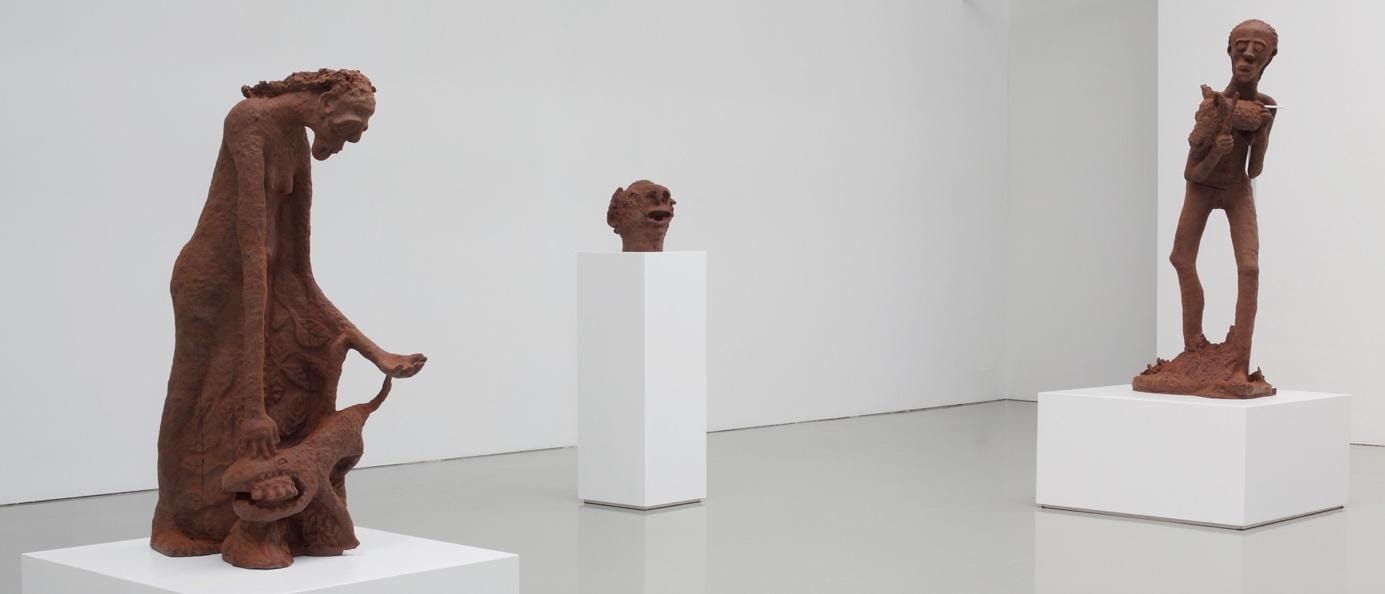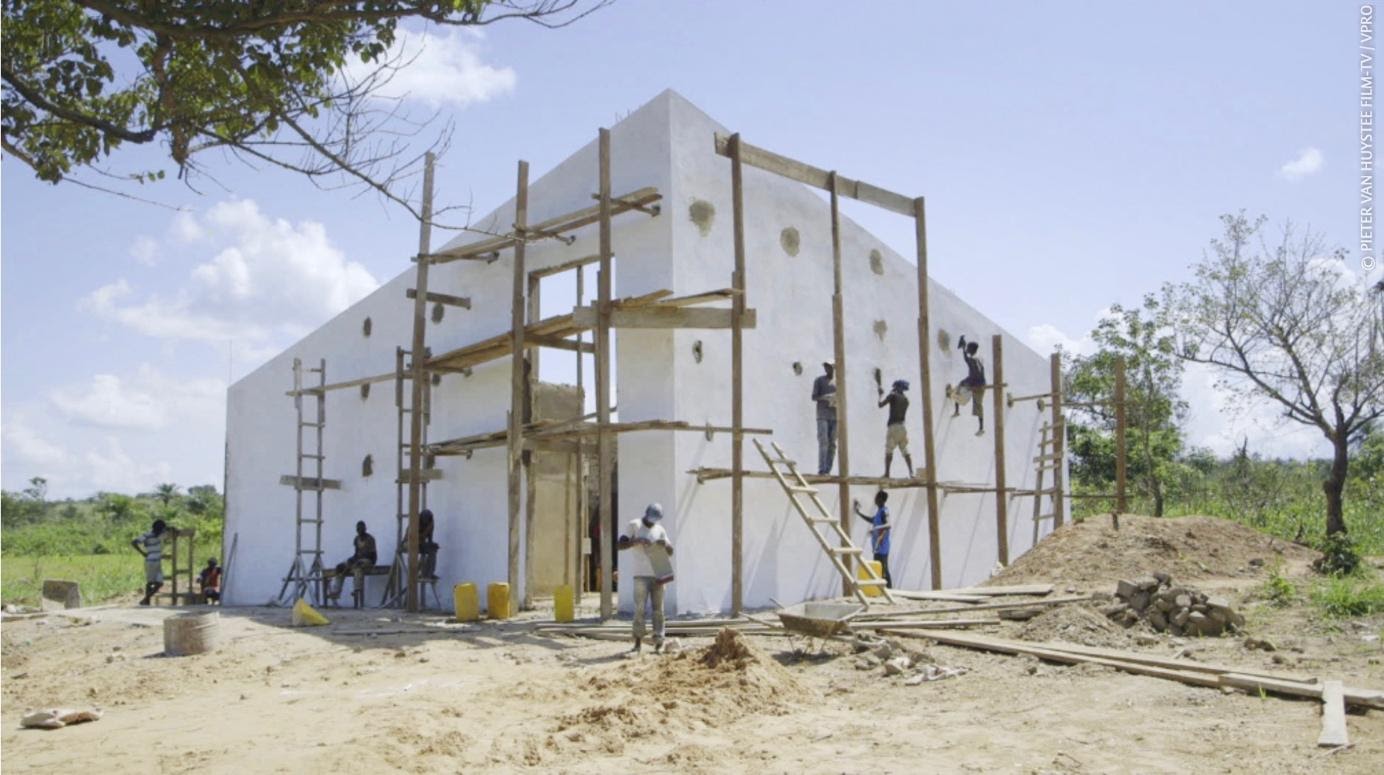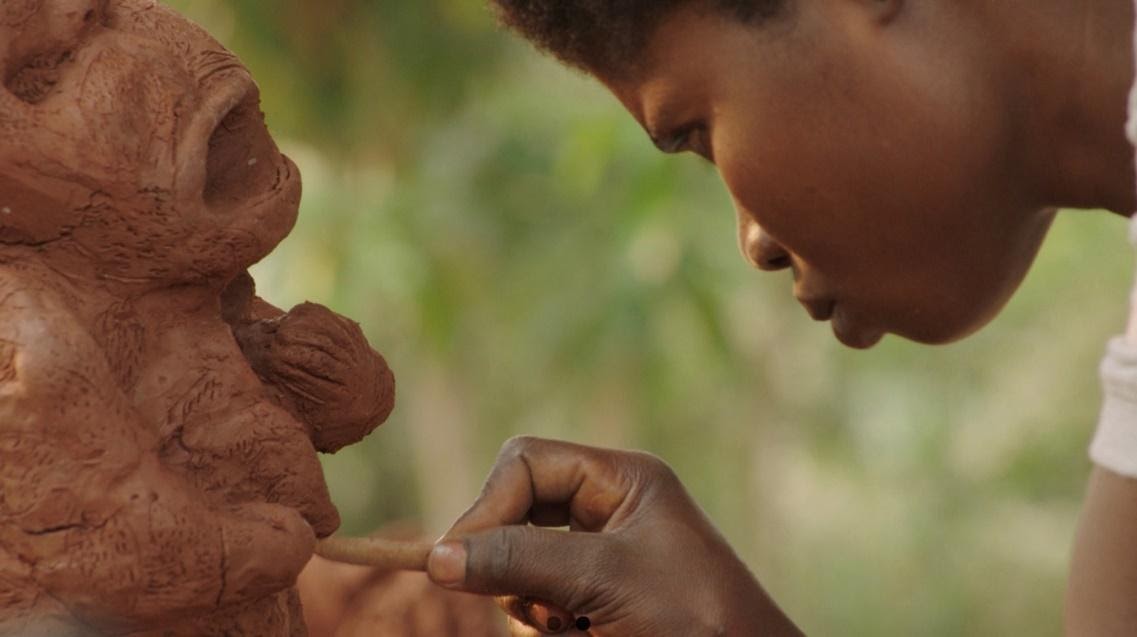Martens, Renzo - VM - Grady van den Bosch
Renzo Martens: White Cube

Righteousness through Art?
by Grady van den Bosch
Blessed are those who hunger and thirst for righteousness, for they will be filled.
Matthew 5:6
How ethical is it, as a white Westerner, to develop an artistic project in a little village in the interior of the Democratic Republic of Congo? Is it possible to have pure intentions when giving form to your own ideas amongst unsuspecting natives? Why do you say that you want to help the underprivileged population? Possibly the motives are sincere, but perhaps you are also not averse to a bit of fame. Amidst all of these questions Renzo Martens makes his own unique way. Yet, however you evaluate his socially engaged art projects in the Congo, it leaves us Westerners at the very least wriggling uncomfortably in our chairs.
Martens shows that Unilever, as a Western multinational, exploits its workers in Africa. Unilever pays them a pittance that is not enough to feed them for a month. At the same time Unilever shows off and attracts attention by generously sponsoring artistic exhibitions in the Tate Modern in London. In Martens’ opinion, also the art establishment is guilty.
He proposes a different way: the flow of money should be reversed, towards Africa. With this in mind he devised various artistic projects. Already in 2008, before he found out about Unilever in the Tate Modern, he released his film Enjoy Poverty: Episode III. In this film we see how Martens encourages the poor population of the Congo to exploit the only thing over which they still have control, their poverty. He gave them cameras to photograph, for example, undernourished babies. Unfortunately, the West had no interest in these photos. However, the film was successful; it was shown all over the world and Martens generated interest.
In 2010 he founded IHA, the Institute of Human Activities, which enabled him to establish a museum in 2017 in the Congolese village of Lusanga. It is situated in the middle of the jungle, designed by Rem Koolhaas. Analogous with modernistic Western museums he called it the White Cube. The New York Times called it one of the most interesting projects of 2017. And… millions are being invested by third parties.

Martens also established a collective of local artists, the CATPC (Cercle d’Art des Travailleurs de Plantation Congolaise). The local artists are working at a striking project: they make expressive sculptures in clay, human figures, sometimes self-portraits. These sculptures are scanned in 3D and subsequently they are cast in chocolate. Chocolate is a Congolese export product. The chocolate sculptures are exhibited and sold in Western museums, as in the MOMA in New York. I myself saw them in the Van Abbe Museum in Eindhoven. They attract a lot of attention; in 2018 already 3000 were sold.

With the earnings of the art projects the locals can buy land from the heirs of Unilever, who left the area as impoverished ground, exhausted by the cultivation of a monoculture of palm oil plantations. Now that the population is planting different crops, more biodiversity has been achieved. Martens landed in the top 100 for sustainability in the Dutch newspaper Trouw.
In 2020 the film White Cube was released, showing how the above-named projects were carried out. It is a candid and sometimes touching narrative. We see how the local population derives strength from the projects as well as a certain self-awareness. Also, how it gives them a voice to present injustice. Art provides the possibility for self-expression and emancipation.
Because Martens is advancing his own reputation in the world of art, the question arises how disinterested his activities are. If I put myself on his side, I see a kind of David who challenges the Goliaths of this world, the Western multinationals, in particular Unilever. That calls up sympathy. He is really doing something! On the other side it can also be seen as a kind of neo-colonialism: he knows better and controls the process. However, he does not steal, he gives back. Will it take root? Are all the efforts sufficiently anchored in the Congo, allowing for their continuation, even without Martens?
My take on his projects is that he teaches me something about the relationships between the West and Africa, about the relationship between riches and poverty, about dirty art and honest art. Perhaps we can learn from him how to do better.
Jesus did not walk around vulnerable people; he healed them. He taught us to care for everyone, not only the respectable and consequential people. That is our task also. What will you do? It is up to each of us how we shall fulfil the task of righteousness. Renzo Martens does it his way. In the film White Cube we see how he makes people happy in doing so.
*******
Renzo Martens: White Cube, 2020, film, 79 minutes.
Renzo Martens (1973) is a Dutch artist and filmmaker, who lives in Amsterdam, NL and Kinshasa, Democratic Republic of Congo. Renzo Martens studied Political Science at the University of Nijmegen, NL and Visual Art at the Koninklijke Academie voor Schone Kunsten (KASK) of Ghent (Belgium) and the Rietveld School of Art and Design in Amsterdam. After his studies, in 2010, he was artist in residence at the ISCP (International Studio & Curatorial Program) in New York City. In 2013 he was one of the 16 participants at the Signature Leadership Program of Yale University. The artist is currently working on a PhD in Art at the School of Arts in Ghent. He lectured about art, economics and representation at University College London, London School of Economics, Yale University, Goldsmiths (University of London), Staatliche Hochschule für Bildende Künste in Frankfurt, Germany (courses taught there in English), HEAD (Geneva University of Art and Design) Geneva, Switzerland HISK, (Institute for Fine Arts) and KASK (Royal Academy of Fine Arts) in Ghent. At the beginning of the film White Cube Martens explains that he has profited his whole life from the poverty in Africa and elsewhere and that he now wants to give back. Because, as he says, he “knows a bit about art,” he does that by means of art. Just like Enjoy Poverty the film is being shown all over the world.
Grady van den Bosch is Master of Education in Arts. She works as art and music educator and artist from her own business Studio Grady Art & Art Education. She is actively involved in various national work groups in the area of art and church and art and faith. Grady is an editor with ArtWay. http://gradyvandenbosch.nl
ArtWay Visual Meditation March 6, 2022


